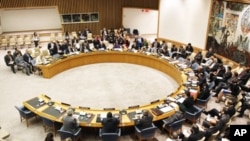The U.N. Security Council has unanimously approved a resolution renewing the mandate for U.N. peacekeeping troops on the Golan Heights, between Syria and Israel.
After several days of behind the scenes talks, the Security Council scheduled a formal meeting to consider a resolution renewing the mandate for six months of the U.N. Disengagement Observer Force, created in 1974 to maintain the ceasefire on the Golan Heights between Israel and Syria.
Again, the council retreated behind closed doors for further talks before finally voting publicly and unanimously to extend the mandate for the peacekeepers.
The delay suggested the disagreement among the council’s five veto-wielding permanent members. The United States, Britain and France have pressed for additional language in the resolution on the violence within Syria. Russia and China rejected the idea, calling the situation in Syria an internal matter.
Britain’s representative Philip Parham said Syria’s government has met legitimate demands for reform with brute force. “The situation in Syria is not sustainable," he said. "If we genuinely want to see an end to the violence, this council should send a clear message underlining our collective concern.”
In contrast, Russia’s representative, Alexander Pankin, told the Security Council the resolution it approved simply extended the mandate of the U.N. force. He suggested that is as far as the council should go.
“The resolution adopted today, of which Russia was a co-sponsor, is technical in nature and does not have any relation to the developments in the political situation in Syria or Israel," said Pankin. "Syria is not on the agenda of the Security Council because it is not a threat to international peace and security.”
For his part, Syria’s representative was critical of countries that he said had attempted to force the Security Council into issues that are none of its business.
Speaking for the United States, ambassador Rosemary DiCarlo was sharply critical of Syria’s government for brutally repressing the Syrian people.
“The Syrian people have shown their courage in demanding a transition to democracy," said DiCarlo. "The Syrian government must stop shooting demonstrators and allow peaceful protest. It must release political prisoners and stop unjust arrest and torture.”
The resolution adopted by the Security Council expresses grave concern at what it calls the “serious events” on May 15 and June 5 that its says put the long-held ceasefire in jeopardy. Palestinian demonstrators had tried to break through the ceasefire line and were confronted by Israeli troops.
The resolution calls for the parties to exercise maximum restraint and prevent any breaches of the ceasefire.


